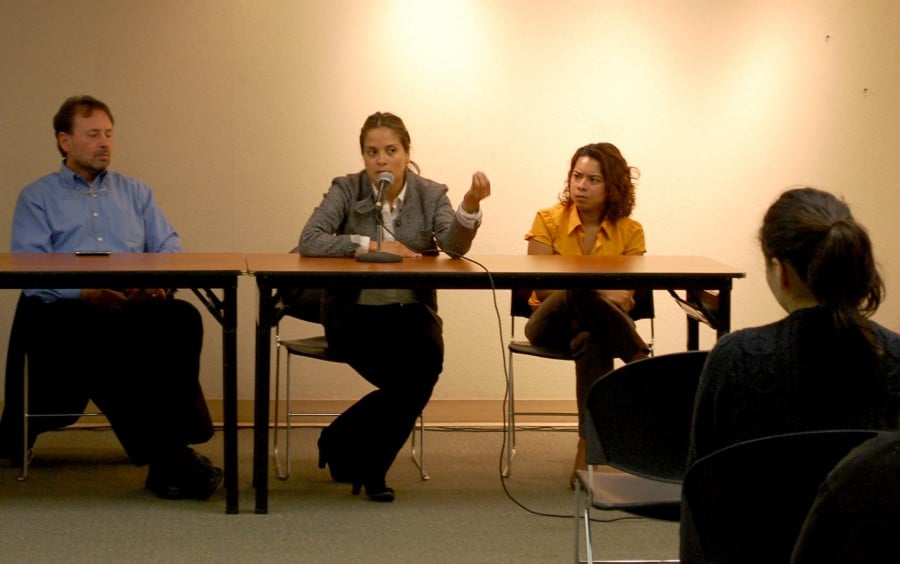Senior Yazmin Garcia Rico has never read the dense, legal words that comprise 287 (g), the contentious law that allows local police officers to enforce federal immigration law. Then again, she does not have to. She sees them in action every day in her home of Alamance County.
Patrol cars wait outside Graham churches and Mebane factories — wait for Latino worshippers and workers to head home. Deputies pull over Latino drivers for playing meringue music too loud. Honor-roll immigrant students’ goals after high school are to find a job at the mall because they incorrectly believe they cannot attend a United States college.
“The meaning to 287 (g) may say something else, but the reality is we are being profiled and targeted because of who we are, not what laws that we might or might not be breaking,” Garcia Rico said. “This is the reality of America for a lot of Hispanics.”
Rico was one of four Hispanic speakers who participated in a Sept. 29 panel discussion in Founders Gallery on the high-stakes issue of immigration in America today. The forum was part of Guilford’s ongoing celebration of Hispanic Heritage Month, which runs through Oct. 15.
Under the federal program, participating jurisdictions, such as the Alamance County Sheriff’s Department, can deputize local law enforcement officials to receive training and assist U.S. Immigration and Customs Enforcement in processing illegal immigrants. The local officers investigate suspects who they think are illegal immigrants, working with the federal agency to increase arrests and expedite the deportation process.
Garcia Rico and her fellow panel members spoke eloquently and, at times, passionately about the problems with continuing the current immigration law.
Nolo Martinez, a University of North Carolina Greensboro professor and former director of the Governor’s Office of Hispanic Affairs, went so far as to argue there should be no illegal immigrant debate.
“What you have is a ruling class that has labeled individuals different from what they’ve labeled themselves,” Martinez said. “We have people who have settled here and removed the illegal immigrant term from who they are, but now they want to label other people under that term.”
Under 287 (g), the United States has deported roughly 31,000 immigrants — some 3,000 from North Carolina — since 2006, according to federal statistics.
Martinez said that immigration is the United State’s biggest investment and that the loss of those immigrants hurts the U.S. economy.
“Those are immigrants who worked honest jobs — a lot of job many Americans choose not to do,” said Martinez. “They are working, buying Americans goods and keeping the economy going just like everyone else — until they are deported.”
The program has become popular with elected officials whose constituents want tougher action on illegal immigration. Since 2005, the number of state and local agencies participating in 287(g) nationwide has increased from four to 63. Seven North Carolina law enforcement agencies are part of the program.
Civil libertarians and immigration advocacy groups have complained that participating law-enforcement agencies have unduly made targets of immigrants who commit relatively minor offenses, like traffic violators. There have also been widespread accusations that police officers have engaged in racial profiling.
Rico, whose family immigrated to North Carolina seven years ago from Mexico, said many Americans are not seeing the suffering of Latinos at the hands of the law. She said that wives in abusive relationships are reluctant to call police for fear that they will be deported.
Gama Gonzalez, a panel member and program director for Catholic Social Services in Winston- Salem, said that many Americans do not know about the suffering Latinos face, because they are reluctant to discuss the issue.
“It’s a matter of trust,” said Gonzalez. “People in our communities only trust people in our communities. They’re afraid to speak up.”
Guilford’s Latino Community Program Coordinator and moderator of the panel, Jorge Zeballos, said that it is up to Americans to reach out to the Latino community.
“You can’t wait for the stories to come to you,” Zeballos said. “You have to go to them. Create those relationships yourself.”

